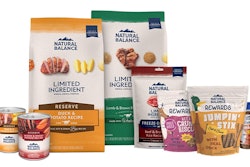Global food awareness association, ProVeg International, has praised a UK industry industry association for acknowledging that nutritionally sound, plant-based pet food can provide a healthy diet for both cats and dogs. Such acknowledgements are rare among national pet food associations globally. UK Pet Food, previously known as the Pet Food Manufacturers’ Association (PFMA), has produced a new fact sheet, which addresses the feeding of plant-based food to pets in light of the growing availability of these products on the market. The fact sheet states that manufactured vegetarian and vegan (entirely plant-based) diets are now available for both cats and dogs. “With advancing technology and research, nutrients that were previously only available from animal-based ingredients can now be made synthetically or be sourced from novel ingredients,” the fact sheet states. It goes on to note that “whilst it is technically possible to make complete and balanced vegetarian and vegan diets for dogs and cats, these require careful formulation by highly qualified animal nutritionists to ensure that they meet the needs of pets at their various life stages, as well as addressing the particular needs of the species concerned.” ProVeg welcomes fact sheet publication “This is really welcome news for many pet owners, particularly those who follow a vegetarian or vegan diet themselves, that there is the option to feed their cats and dogs food that does not derive from other animals,” Stephanie Jaczniakowska-McGirr, director of corporate engagement for ProVeg International, said. “This comes, in no small part, as a result of studies published in peer-review journals that confirm that plant-based pet food is healthy, and can even be healthier, than conventional, meat-based pet food,” she added. Scientific evidence on the healthiness of plant-based food for dogs accumulated last year with the publication of a number of studies in peer-reviewed journals. A study published in April 2022 was carried out by a team of researchers in the UK and Australia who found that the healthiest and least hazardous food for dogs is provided by a nutritionally sound plant-based diet. The study, funded by a ProVeg research grant, represented the first large-scale investigation of its kind into the health outcomes of dogs and involved over 2,500 dogs. It compared the health outcomes of dogs on a conventional diet compared to those on raw meat diets and those on plant-based pet food. Another study, published in Research in Veterinary Science, collected dietary information from 1,189 dog guardians-- including 357 feeding solely plant-based diets--who had fed these diets for 3 years on average. The study found that dogs fed plant-based food were reportedly more likely to enjoy very good health, and less likely to suffer ocular, gastrointestinal and hepatic (liver) disorders. No health disorders were more likely, and longevity of previously-owned dogs was reportedly 1.5 years greater, when fed purely plant-based diets. A third study, carried out by pet food company Omni was published in the Archives of Clinical and Biomedical Research and found, among other results, that its plant-based dog food product gave dogs glossier coats and less anxiety compared to dogs fed largely on a meat-based diet. Studies have also been published focused on cats. In 2021, veterinarians Dr. Sarah Dodd and colleagues published a large scale study, including dietary information for 1,026 cats, of whom 187 were fed plant-based diets with the latter being more frequently reported by guardians to be in very good health. An earlier study carried out in 2006 was published in the Journal of the American Veterinary Medical Association comparing the health status of 34 cats maintained on vegetarian diets, and 52 maintained on conventional diets, for at least one year. No significant differences existed in age, sex, body condition, housing, or perceived health status between the two groups. Most of the caregivers in both groups described their cats as healthy or generally healthy. Advice on cats The UK Pet Food fact sheet points out that cats are obligate carnivores and have highly exacting nutritional needs, which means they cannot obtain all the nutrients that they need from the plant kingdom but they can digest and absorb some nutrients from plant based materials. According to Dr Sarah Dodd, in the conclusions to her study on the effect of plant-based diets on cats, the owners’ perception of the health and wellness of their cats does not appear to be adversely affected by being fed a plant-based diet. “Contrary to expectations, owners perceived no body system or disorder to be at particular risk when feeding a plant-based diet to cats,” the conclusion states. It goes on to say that further research is warranted. According to UK Pet Food, their members represent around 90% of the UK pet food market.
|











